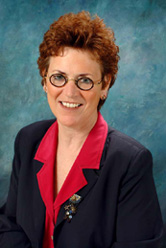UNMC was selected recently by the Association of American Medical Colleges (AAMC) to participate in the nationwide Academic Chronic Care Collaborative. UNMC is one of 22 medical schools and teaching hospitals to participate in the new program designed to improve care of chronically ill patients.
 |
Sheila Ryan, Ph.D. |
Chronic diseases are conditions of long continuance and possibly slow progression and include diabetes, asthma and arthritis. Approximately 100 million Americans suffer from chronic conditions.
UNMC will focus on improving patient outcome in chronic care, which has been a national focus in recent years, Dr. Ryan said. For example, many diabetes patients believe they have their blood sugar under control when they do not. Medical personnel involved in the Chronic Care Collaborative will learn how to more effectively help persons with chronic conditions.
“Health care across this country is very regional, with significant differences in the way patients are treated and with differing outcomes,” said Stephen Smith, M.D., chief medical officer for The Nebraska Medical Center. “The opportunity to share information with 21 other institutions representing many different parts of this country provides a benchmarking opportunity for us to compare our processes and outcomes, learn from our colleagues and improve our care here on our campus.”
This national collaborative includes three learning sessions for all participating multidisciplinary teams that aim to improve patient outcomes from diabetes, asthma or other chronic conditions. UNMC clinics will teach residents in internal medicine, family medicine, pharmacy, nutrition and nurse practitioners about the improvement processes for patients with chronic care conditions. The Nebraska Medical Center will support UNMC as a leader in quality improvement.
Dr. Ryan said the project’s focus is to help transform the health care system from one that is reactive — responding mainly when a patient is sick – to one that is proactive and focused on keeping a person as healthy and functional as possible.
The Academic Chronic Care Collaborative, in partnership with the Robert Wood Johnson Foundation’s national Improving Chronic Illness Care program, is based on the Chronic Care Model created by Ed Wagner, M.D., of Seattle’s MacColl Institute for Healthcare Innovation. The model identifies the essential elements of a health care system to encourage high-quality chronic disease care.
According to the AAMC, 80 percent of Medicare recipients have one or more chronic illnesses, a resource burden that amounts to the overwhelming majority of Medicare expenditures. Despite the personal burden of illness and the strain on community resources, many deficiencies remain in the current management of chronic conditions.
According to the AAMC, they include lack of care coordination, hurried practitioners, inadequate use of effective treatments, lack of systematic follow-up to ensure the best outcomes and patients who are inadequately prepared to manage their own illnesses.
The Chronic Care Model emphasizes improving processes in patient care by studying patient data for better outcomes, enhancing clinical information systems, collaborating within a multidisciplinary team, comparing results to other clinics and academic health centers and continuous system trials for improving practice results and clinical decision-making.
Dr. Ryan believes the Chronic Care Model relies heavily on patients and family, and by teaching the model to individual multidisciplinary teams, UNMC will more successfully assist people affected by chronic diseases.
UNMC will first use the program as an 18-month trial to discover the best way to educate all health professionals in improvement processes. A team of physicians, nurse managers, system leaders and project directors will attend training sessions in June, September and February.
“The bottom line is that we will be improving our care — both in terms of outcomes and efficiency,” Dr. Smith said.